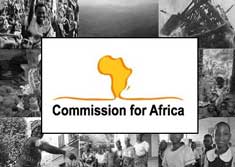 |
Blair unveils 'bold' Africa report
14 March 2005
President Thabo Mbeki has expressed confidence that the world's rich nations will implement the proposals contained in the ambitious Commission for Africa report released in London on Friday.
The report calls for debt relief for Africa's poorest countries, a US$25-billion a year increase in aid to Africa by 2010, and a further increase of $25-billion a year by 2015 to address what British Prime Minister Tony Blair called "the greatest tragedy of our time" - African poverty and stagnation.
"Africa – at country, regional, and continental levels – is creating much stronger foundations for tackling its problems", the report states. "Recent years have seen improvements in economic growth and in governance.
"But Africa needs more of both if it is to make serious inroads into poverty. To
do that requires a partnership between Africa and the developed world which takes full account of Africa's diversity and particular circumstances."
Flanked by musician Bob Geldof, British finance minister Gordon Brown and South African finance minister Trevor Manuel, the British leader described the 400-page document as a "forceful response" to poverty in Africa.
"There can be no excuse, no defence, no justification for the plight of millions of our fellow beings in Africa today", Blair said. "That is the simple message from the report published today.
"We cannot allow this to continue. It is, I believe, the biggest moral challenge of our generation. A challenge for all of us - for the governments of Africa and the countries of the developed world."
Blair said he would campaign for support for the report's proposals at the G8 and European Union; he is due to take over the chairmanship of both bodies later this year.
Other proposals contained in the
report include:
- Governance. The report calls on African states to improve their governance, accountability and transparency - and on rich countries to help with this by investing in African capacity building.
"We recommend that donors make a major investment to improve Africa’s capacity, starting with its system of higher education, particularly in science and technology", the report states. "They must help to build systems and staff in national and local governments, but also in pan-African and regional organisations, particularly the African Union and its Nepad programme."
At the same time, the report urges donors to "change their behaviour and support the national priorities of African governments rather than allowing their own procedures and special enthusiasms to undermine the building of a country's own capacity".
- Peace and security. The report calls for better use of aid to help build the capacity of African states to prevent and
manage conflict. It also calls for better control of the international trade in small arms, as well as in the "conflict resources" which fuel or fund hostilities.
- More and fairer trade. The report calls on African countries to make internal changes to improve the continent's capacity for trade - including tackling corruption, cutting red tape, making it easier to set up a business, and improving regional economic integration.
At the same time, it calls on rich countries to "dismantle the barriers they have erected against African goods, particularly in agriculture" - including abolishing agricultural subsidies, and lowering tariff and non-tariff barriers to African products.
- Investing in people. The report recommends that half of the extra $26-million in aid per year be spent on health, education and HIV and Aids. "Investing for economic growth means rebuilding African health and education systems", the report states.
"This requires major
funding, but it is not only a question of resources. It is also about delivery and results. These are powerfully strengthened when local communities are involved in decisions that affect them."
- Infrastructure. The report recommends that a third of the extra $26-million in aid per year be used to fund a doubling of spending on transport and communications infrastructure, including both rural development and urban slum upgrading, and with a special focus on agriculture, small enterprises, women and young people.
"Africa is poor, ultimately, because its economy has not grown", the report argues. "The public and private sectors need to work together to create a climate which unleashes the entrepreneurship of the peoples of Africa, generates employment and encourages individuals and firms, domestic and foreign, to invest."
Speaking to reporters in Pretoria on Friday, Mbeki said he hoped the document would stir world leaders into action to achieve "measurable
and practical progress".
"It must translate not into a lot of paper, but into a firm, serious programme of action", Mbeki said. "There is a lot of work contained in here. My own sense is that everybody is very keen to achieve actual, measurable progress."
He added that the blueprint would fall in with existing decisions taken by multilateral forums pushing for Africa's debt cancellation, increased investment and aid.
The report has been welcomed by African and global leaders and activists, with many praising it as a radical blueprint that, if implemented, could turn Africa's misfortunes around.
"The Commission for Africa has come out with a clear, bold and realistic vision for how Africa and the rest of the world together can bring this continent onto a road of development and prosperity", said Global Fund executive director Richard Feachem.
World Bank President James Wolfensohn said the World Bank Group "strongly endorses the Commission for Africa
Report and we hope that the global community will work to advance its principal recommendations.
"We share the hope expressed in the report that the unacceptable trends of impoverishment and marginalisation in the world's poorest region can be reversed", Wolfensohn said.
"African governments can build on progress already evident in a number of countries that have reduced conflict, are addressing corruption, and developing national strategies to generate economic growth and cut poverty levels.
"The international community, for its part, needs to deliver on promises for substantial increases in aid and debt reduction, as well as improved market access."
SouthAfrica.info reporter


|  |
|







